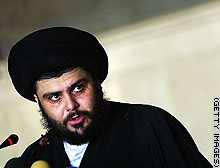|
|
Home | World | U.S. | Weather | Business | Sports | Analysis | Politics | Law | Tech | Science | Health | Entertainment | Offbeat | Travel | Education | Specials | Autos | I-Reports |
|
|
|
Home | World | U.S. | Weather | Business | Sports | Analysis | Politics | Law | Tech | Science | Health | Entertainment | Offbeat | Travel | Education | Specials | Autos | I-Reports |
|

Story Highlights• U.S. military spokesman says radical Shiite cleric Muqtada al-Sadr in Iran• Al-Sadr aide denies U.S. claim, says cleric staying out of public eye • U.S. officials say al-Sadr fled to Iran to avoid crackdown on militias • U.S. military spokesman won't confirm Iran government directing weapons supply Adjust font size:
BAGHDAD, Iraq (CNN) -- The United States insists a radical Shiite cleric is in Iran despite denials from Muqtada al-Sadr's supporters. U.S. military spokesman Maj. Gen. William Caldwell said Wednesday that the United States believes al-Sadr is in neighboring Iran. Caldwell declined to speculate on what would prompt al-Sadr to go there. But an aide close to al-Sadr said Wednesday that the cleric was in the holy city of Najaf, about 75 miles (120 kilometers) south of Baghdad, where he lives. (Watch why al-Sadr's whereabouts are a mystery Senior Bush administration sources said Tuesday that al-Sadr had fled Iraq for Iran two to three weeks ago out of fear for his safety amid a crackdown on militias in Iraq. But the cleric's aide said al-Sadr has decided not to appear in public during Muharram, the current month in the Islamic calendar, and next month during Safar. Muharram and Safar are two of the four holy months of an Islamic year. Iran's Islamic Republic News Agency also reported that an "informed source on Wednesday rejected reports by the foreign media" that al-Sadr was in Iran. Even if he were in Iran, as Washington asserts, it would not be unusual. Al-Sadr has made a half-dozen official trips and an unknown number of personal trips to Iran in the last few years. Senior administration sources said they believe al-Sadr left in anticipation of the U.S. military increase and subsequent crackdown on militias and because of splits with extremist elements within his militia, the Mehdi Army. The Mehdi Army is blamed for a large part of the sectarian violence in Baghdad and other parts of Iraq. Some observers have predicted that followers of al-Sadr and his militia would be overlooked in the new security crackdown because the al-Sadr movement has backed Prime Minister Nuri al-Maliki, also a Shiite. But raids by U.S. and Iraqi forces over the last month have netted two high-profile al-Sadr associates -- Deputy Health Minister Hakem Abbas al-Zamili and Abdul Hadi Darraji, the head of the cleric's media office. Iraqi soldiers also killed a Mehdi Army official during a raid in Diyala province. One administration official said al-Sadr feared he could be next, adding that since President Bush announced his so-called surge, U.S.-led coalition forces have seen militia members "bailing out or going underground." Other developmentsCNN's Jomana Karadsheh, Barbara Starr and Mohammed Tawfeeq contributed to this report.  Shiite cleric Muqtada al-Sadr's Mehdi Army militia is blamed for a large part of the sectarian violence throughout Iraq. Browse/Search
VIDEOSPECIAL REPORT
• Interactive: Who's who in Iraq
• Interactive: Sectarian divide
• Timeline: Bloodiest days for civilians
|